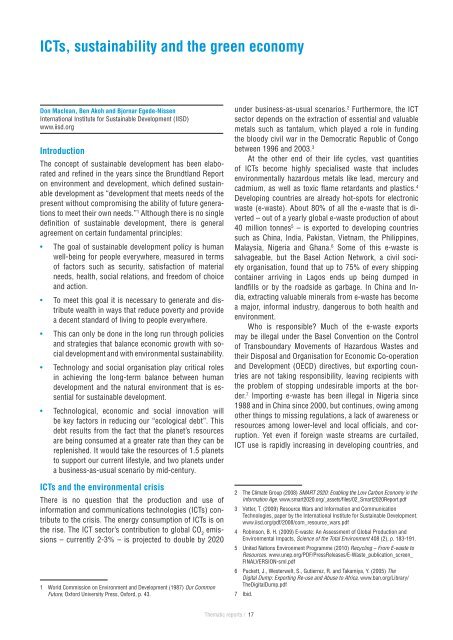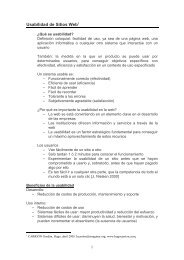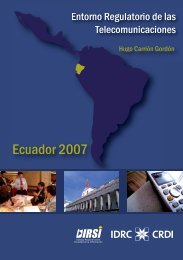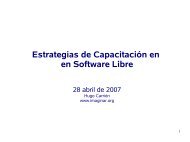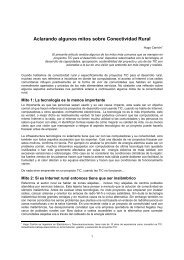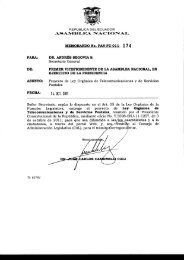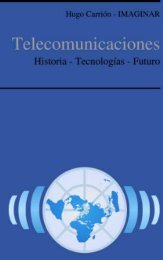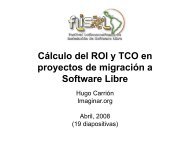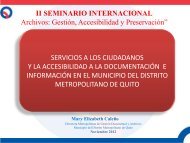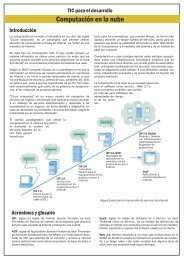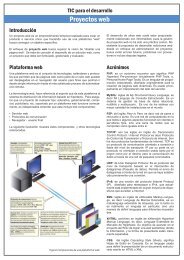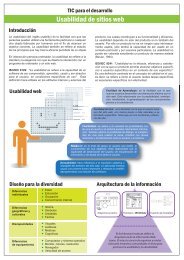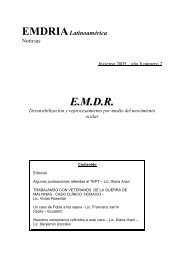GLOBAL INFORMATION SOCIETY WATCH 2010
GLOBAL INFORMATION SOCIETY WATCH 2010
GLOBAL INFORMATION SOCIETY WATCH 2010
You also want an ePaper? Increase the reach of your titles
YUMPU automatically turns print PDFs into web optimized ePapers that Google loves.
ICTs, sustainability and the green economy<br />
Don Maclean, Ben Akoh and Bjornar Egede-Nissen<br />
International Institute for Sustainable Development (IISD)<br />
www.iisd.org<br />
Introduction<br />
The concept of sustainable development has been elaborated<br />
and refined in the years since the Brundtland Report<br />
on environment and development, which defined sustainable<br />
development as “development that meets needs of the<br />
present without compromising the ability of future generations<br />
to meet their own needs.” 1 Although there is no single<br />
definition of sustainable development, there is general<br />
agreement on certain fundamental principles:<br />
• The goal of sustainable development policy is human<br />
well-being for people everywhere, measured in terms<br />
of factors such as security, satisfaction of material<br />
needs, health, social relations, and freedom of choice<br />
and action.<br />
• To meet this goal it is necessary to generate and distribute<br />
wealth in ways that reduce poverty and provide<br />
a decent standard of living to people everywhere.<br />
• This can only be done in the long run through policies<br />
and strategies that balance economic growth with social<br />
development and with environmental sustainability.<br />
• Technology and social organisation play critical roles<br />
in achieving the long-term balance between human<br />
development and the natural environment that is essential<br />
for sustainable development.<br />
• Technological, economic and social innovation will<br />
be key factors in reducing our “ecological debt”. This<br />
debt results from the fact that the planet’s resources<br />
are being consumed at a greater rate than they can be<br />
replenished. It would take the resources of 1.5 planets<br />
to support our current lifestyle, and two planets under<br />
a business-as-usual scenario by mid-century.<br />
ICTs and the environmental crisis<br />
There is no question that the production and use of<br />
information and communications technologies (ICTs) contribute<br />
to the crisis. The energy consumption of ICTs is on<br />
the rise. The ICT sector’s contribution to global CO 2<br />
emissions<br />
– currently 2-3% – is projected to double by 2020<br />
1 World Commission on Environment and Development (1987) Our Common<br />
Future, Oxford University Press, Oxford, p. 43.<br />
under business-as-usual scenarios. 2 Furthermore, the ICT<br />
sector depends on the extraction of essential and valuable<br />
metals such as tantalum, which played a role in funding<br />
the bloody civil war in the Democratic Republic of Congo<br />
between 1996 and 2003. 3<br />
At the other end of their life cycles, vast quantities<br />
of ICTs become highly specialised waste that includes<br />
environmentally hazardous metals like lead, mercury and<br />
cadmium, as well as toxic flame retardants and plastics. 4<br />
Developing countries are already hot-spots for electronic<br />
waste (e‐waste). About 80% of all the e‐waste that is diverted<br />
– out of a yearly global e‐waste production of about<br />
40 million tonnes 5 – is exported to developing countries<br />
such as China, India, Pakistan, Vietnam, the Philippines,<br />
Malaysia, Nigeria and Ghana. 6 Some of this e‐waste is<br />
salvageable, but the Basel Action Network, a civil society<br />
organisation, found that up to 75% of every shipping<br />
container arriving in Lagos ends up being dumped in<br />
landfills or by the roadside as garbage. In China and India,<br />
extracting valuable minerals from e‐waste has become<br />
a major, informal industry, dangerous to both health and<br />
environment.<br />
Who is responsible? Much of the e‐waste exports<br />
may be illegal under the Basel Convention on the Control<br />
of Transboundary Movements of Hazardous Wastes and<br />
their Disposal and Organisation for Economic Co-operation<br />
and Development (OECD) directives, but exporting countries<br />
are not taking responsibility, leaving recipients with<br />
the problem of stopping undesirable imports at the border.<br />
7 Importing e‐waste has been illegal in Nigeria since<br />
1988 and in China since 2000, but continues, owing among<br />
other things to missing regulations, a lack of awareness or<br />
resources among lower-level and local officials, and corruption.<br />
Yet even if foreign waste streams are curtailed,<br />
ICT use is rapidly increasing in developing countries, and<br />
2 The Climate Group (2008) SMART 2020: Enabling the Low Carbon Economy in the<br />
Information Age. www.smart2020.org/_assets/files/02_Smart2020Report.pdf<br />
3 Vetter, T. (2009) Resource Wars and Information and Communication<br />
Technologies, paper by the International Institute for Sustainable Development.<br />
www.iisd.org/pdf/2008/com_resource_wars.pdf<br />
4 Robinson, B. H. (2009) E-waste: An Assessment of Global Production and<br />
Environmental Impacts, Science of the Total Environment 408 (2), p. 183-191.<br />
5 United Nations Environment Programme (<strong>2010</strong>) Recycling – From E-waste to<br />
Resources. www.unep.org/PDF/PressReleases/E-Waste_publication_screen_<br />
FINALVERSION-sml.pdf<br />
6 Puckett, J., Westerwelt, S., Gutierrez, R. and Takamiya, Y. (2005) The<br />
Digital Dump: Exporting Re-use and Abuse to Africa. www.ban.org/Library/<br />
TheDigitalDump.pdf<br />
7 Ibid.<br />
Thematic reports / 17


